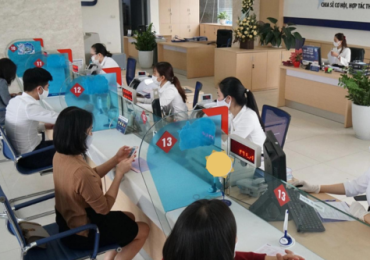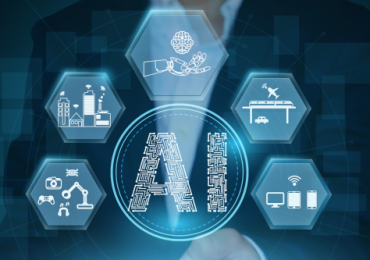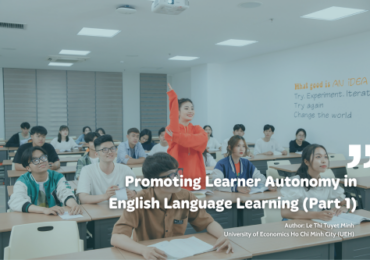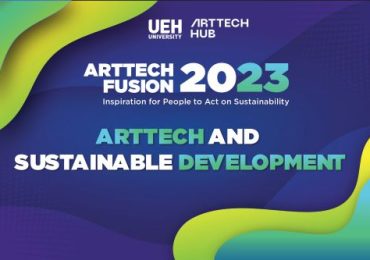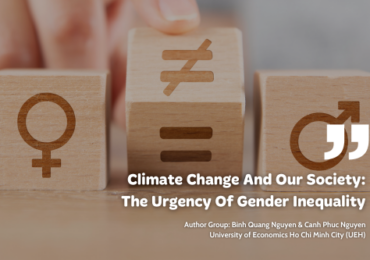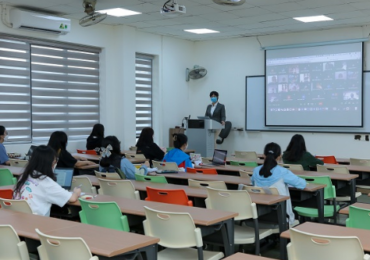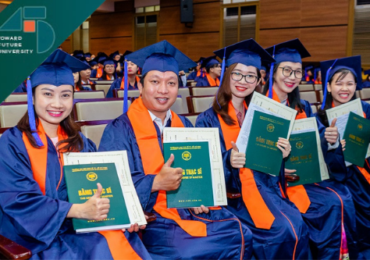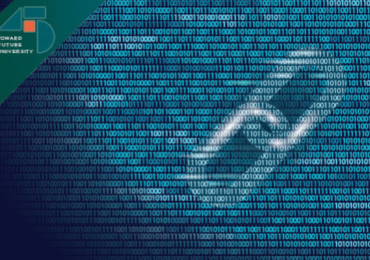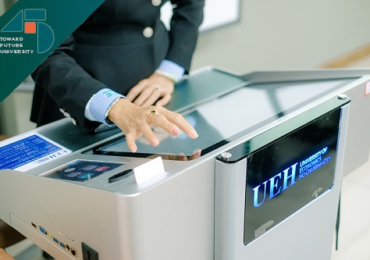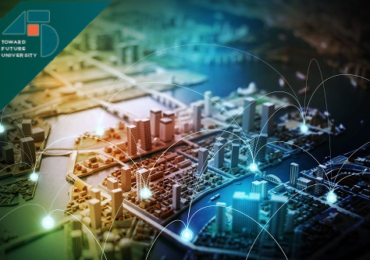The Role of Universities and Research Institutes in the Digital Transformation of the Economy Towards Smart Cities Development in Vietnam (Part 1)
22 February, 2022
It is the implementation process, the achieved results and the challenges in the process of digital transformation of the economy in Vietnam and the current role of universities and research institutes in addition to the role of the Party-State and enterprises that have been synthesized and analyzed in diverse articles. The role of universities and research institutes is implemented in not only education, teaching, transfer or the creation of new knowledge, independent researches but also multidisciplinary integrated research activities to propose new ideas. Practical solutions, consulting and participation in the decision-making process as well as proposing and implementing policies, projects and implementation processes to solve urban problems have brought a lot of success. for digital transformation as well as smart city development in many countries around the world. The authors also propose four groups of activities to enhance the role of universities and research institutes as follows: (1) providing high-quality human resources in line with digital transformation practices; (2) research and development (R&D); (3) consulting and participating in decision-making teams; (4) connecting and promoting the participation of generations.

The outbreak of the Industrial Revolution 4.0
Making full use of the power of Industry 4.0 to carry out digital transformation of the national economy towards building smart cities is a strong development trend worldwide. Smart city development refers to the development of smartness in all fields listed as data, healthcare, economy/business, agriculture, industry, transport, energy, environment, education and so on (CSIRO, 2019).
The Industrial Revolution 4.0 (Industry 4.0) with the application of modern technologies listed as: cloud computing (Cloud Computing), artificial intelligence (AI), Internet of Things (IoT), big data (Big Data) has opened up opportunities for developing the digital economy for countries around the world (Schwab, 2017). As defined by Oxford Digital Economy Collaboration, a digital economy is ‘an economy that operates primarily on digital technologies, especially electronic transactions conducted via the Internet’. In Vietnam, IT is the fastest growing industry (CSIRO, 2019). Vietnam ranks No. 1 globally in the outsourced software services industry, 1st in the mobile application economy index among the 6 most developed countries in ASEAN (TechPort, 2018). Of the approximately 97 million people in Vietnam (2019), 64 million of them use the Internet, an increase of 28% compared to theat of 2017. Among these 64 million users, the number of people accessing the Internet via mobile devices is 61.73 million people, accounting for 96% of internet users (Adsota, 2019). According to data from Department of E-commerce and Information Technology – VECITA (2019), Vietnamese E-commerce market grows by 35% per year, 2.5 times faster than that of Japan. In accordance with Southeast Asian Economy report (2019), the growth rate in digital transformation of the economy in Vietnam is leading in the region and contributes 5% of the national GDP, 4 times higher than the annual value in 2015 and is expected to be nearly four times as high by 2025. The city sets a target of a digital economy accounting for 25% of GRDP by 2025 and 40% by 2030 (TopDev, 2020).
Particularly in terms of education field, digital transformation is currently concentrating on two main contents: digital transformation in educational management and digital transformation in teaching, learning, testing, assessment and scientific research. Education management includes digitizing management information, creating interconnected large database systems, deploying online public services, applying 4.0 Technologies (AI, blockchain, data analysis and so on) in order to manage, operate, forecast, support decision making in the education and training industry quickly and accurately. In teaching, learning, testing and evaluation, including digital chemistry materials (e-textbooks, electronic lectures, e-learning lecture warehouses, multiple-choice question banks), digital libraries, virtual laboratories, deploying an online training system, building virtual universities (cyber universities). However, the current digital transformation of the education and training sector are facing immerse difficulties and problems that need to be further overcome and completed, especially as follows: non-synchronous investment in infrastructure among regions; lack of finance to digitize and to build digital learning materials; no legal regulations to develop online education platforms and digital learning materials.
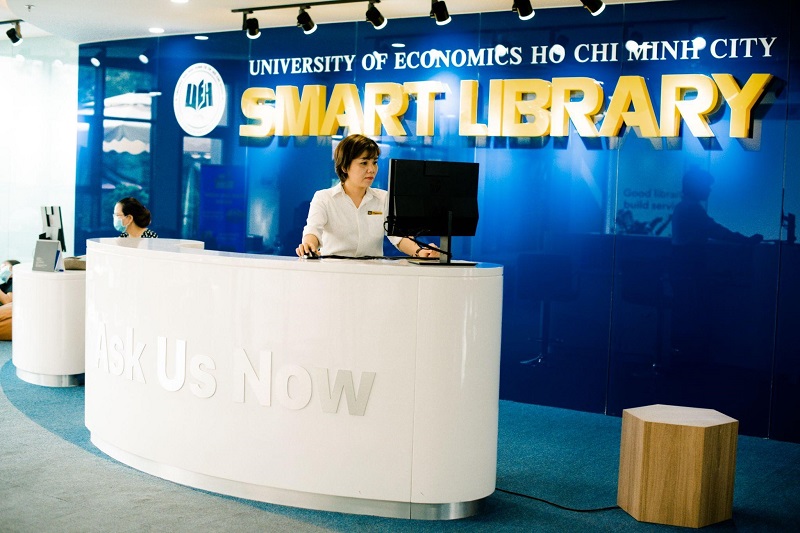
University of Economics Ho Chi Minh City – One of the educational institutions applying comprehensive digital transformation towards Smart University
It is obvious that the strong development of the digital transformation of the economy in Vietnam has been bringing a lot of benefits and contributions to the development of smart cities. In addition, education is also an element that is focused to develop ‘digitization’ and ‘smarter’; nevertheless, the current focus and development is being only the inner development of the education field to update with current development trends, rather than the ability to integrate or other activities to contribute to digital transformation or smart city development as existing capacity.
Lessons learned from countries around the world
The role of universities and research institutes in the digital transformation of the economy and smart city development
With the purpose of preparing for the digital economy since 1998, universities in the European Union have played the role of providing technology-savvy human resources with advanced educational technologies to the region. By means of distance learning and teaching, these schools have spread knowledge to classes that have few opportunities to study regularly like workers, housewives and those who cannot study properly at the right time (Ditchburn, 1998).
With the researching goal on the role of Bio-Medico University (Italy) in smart city projects, Machine Science Journal, conducting a research survey on 20 different smart city projects in 2019, concluded that university acts as a knowledge intermediary, knowledge holder, knowledge provider and knowledge evaluator (Vertical News, 2019).
Researches on the role of universities upon building and developing innovation ecosystems by Markkula and Kune (Markkula & Kune, 2015) pointed out that the current universities have changed the way they operate as active agents towards improving the quality of community life, contributing a lot of value to the development process of the local, regional and national, spreading and maintaining knowledge in the innovation ecosystem. Actually, most European universities play an important role in the transmission of knowledge, academic resources, co-creation and innovation. Specifically, Aalto University, University of Helsinki, VTT Technical Research Center of Finland, Laurea University of Applied Sciences and Metropolia University of Applied Sciences have actively participated in the development of the Bright Garden towards creating Espoo in Helsinki with the main roles of transmitting knowledge, researching and discovering new knowledge and developing community activities with the participation of many sectors of society. These main roles are demonstrated through 5 specific activities as follows:
Connection: Connecting generations (high school students, university students, graduate students, alumni); connecting people and processes (calling, engaging people to actively participate and to contribute to social processes); connecting knowledge and processes (connecting knowledge, theory, academia to practical processes); bringing the stakeholders in the ecosystem closer together.
- Knowledge: Conveying regional and local knowledge, increasing understanding, especially the elderly.
- Continual learning: Learning from the curriculum, from practice, from the ecosystem, making learning continuous in the ecosystem.
- Forecasting and decision-making advice: Proactively predicting problems and providing grounds and ways to solve problems before they happen.
- Preparing for the future generation: Helping young people prepare for future opportunities through capacity building training and coaching.
The leading Spanish educational group CEU (Central European University) including 3 major universities as follows: CEU San Pablo (in Madrid), CEU Cardenal Herrera (Valencia) and Abat Oliba CEU (Barcelona) have identified the role of promoting innovation, research and entrepreneurship in the transformation of the national economy. CED has established and developed centers, research and innovation institutes as part of the knowledge economy and is committed to leading the way in digital transformation applied within CEU itself. In the digital era, CEU determines that new technology and automation will create many new positions in the coming years, and businesses and organizations in the private sector will have great demand, this is a great opportunity for training units, to accompany businesses in change management, especially in terms of human resources. Therefore, in the operation strategy of the corporation and each school in the system, CEU focuses on cooperating and finding opportunities based on the relationship between 3 parties including: private sector and state administrative agencies, universities. In 2019, CEU launched dual degree and postgraduate degree programs for a group of disciplines suitable for the digital era listed as: digital communication, biotechnology, biomedical engineering or data protection.
From the reality and the successes in countries around the world, universities and research institutes have become an integral part of the digital transformation process in the local and national economies and smart urban development. In which, the outstanding roles will include: knowledge role – being the center of nurturing, spreading knowledge to the community, providing digital human resources; roles in research and development (R&D), innovation, creativity, entrepreneurship; intergenerational, predictive and advisory roles for decision-making.
Digital transformation at universities and research institutes around the world
To meet the role in the digital transformation process in the local and national economy and smart city development, universities and research institutes in countries around the world have made changes and been developed as a strong participant in internal digital transformation and increase integration in teaching – research – project implementation to join hands with stakeholders to solve urban problems towards Sustainable Development.
In accordance with EduCause (Grajek, 2020), the research on the argument regarding transfer process at universities around the world by 2020 indicates that 13% of colleges and universities are engaged in digital transformation, 32% are developing a digital transformation strategy and 38% of other higher education institutions are exploring digital transformation, only 17% of educational institutions do not have time to enter the process. This shows that higher education is, indeed, driving digital transformation; in reverse, digital transformation with a series of sweeping changes to the workforce, culture and technology has the ability to create new educational models, concurrently, transforming the strategic orientation and development values of an educational institution. Understanding the role of universities in the nation’s digital transformation can help higher education institutions develop a comprehensive and holistic digital transformation strategy.
The research on the digital transformation process at the university system in Ukraine in the context of the digital transformation of Ukraine (Kaminsky, Yereshko, & Kyrychenko, 2018) has revealed the information technology architecture of a university. Modern technology should be deployed on the basis of cloud technology; thereby, providing training services, scientific research, increasing digital capacity and navigating educational activities towards learners’ personalized way. Blockchain technology for cloud-based content management by integrating training content modules of different Ukrainian universities, creating a unified, quality, secure and training program transparency. This system is expected to achieve the benefits of timely knowledge exchange and update for the community as a foundation for the knowledge economy, including mutual content exchange, new content development and so on, forming an ecosystem of lecturers, learners, scientists, universities: Similar to sharing platforms, stakeholders will come together to share knowledge within the framework of a common platform based on cloud while retaining the identity, the brand and ensuring financial viability.
Since 2015, at the University of Manchester, UK, living labs have been established to identify issues related to sustainable development and support decision-making of stakeholders involved in the sustainable urban development process. Living Lab is a place to connect businesses, governments, scientists to research and test issues in sustainable development, support decision making (Evans, Jones, Karvonen, Millard, & Wendler, 2015). The subsequent research by the authors at the University of Québec à Trois-Rivières (France) (Thang, Manh, & Ayayi, 2018) proved that the Living lab will help promote digital entrepreneurship (Promoting Digital Entrepreneurship Process Living Lab).
Author group: Dr. Trịnh Tú Anh, PhD student. Phạm Nguyễn Hoài, PhD student. Lê Thị Hạnh An (Institute of Smart city and Management ISCM – UEH School of technology and Design).
This writing is in Series spreading research and applied knowledge applied from UEH with message for 2022 year as “Research Contribution For All – Research for Community”, UEH would like to invite Dear readers to follow Newsletter ECONOMY NO. # 29 “The Role of Universities and Research Institutes in the Digital Transformation of the Economy Towards Smart Cities Development in Vietnam (Part 2)”.
News, photos: Author group, UEH Department of Marketing – Communication.


